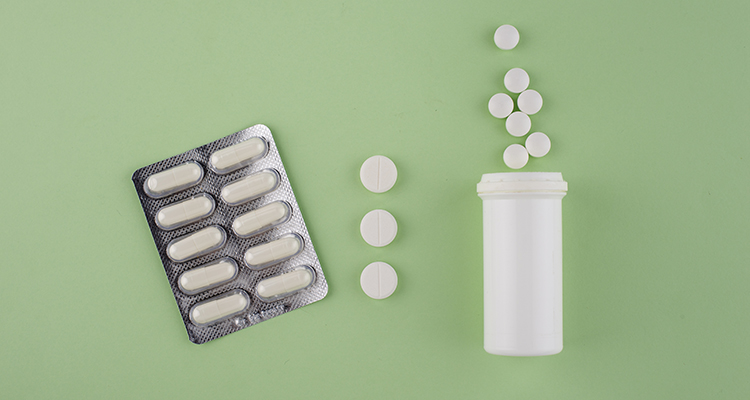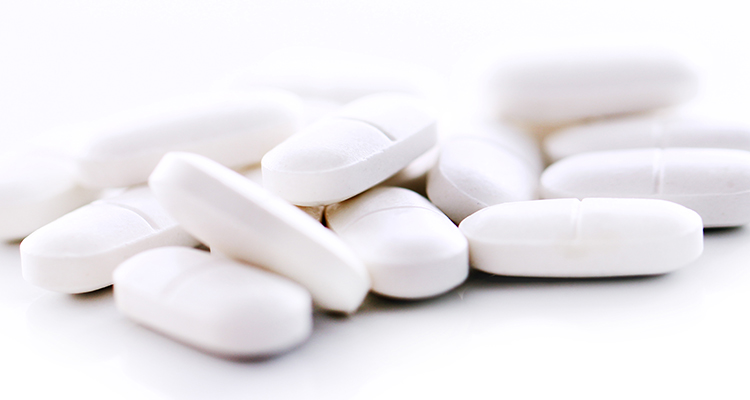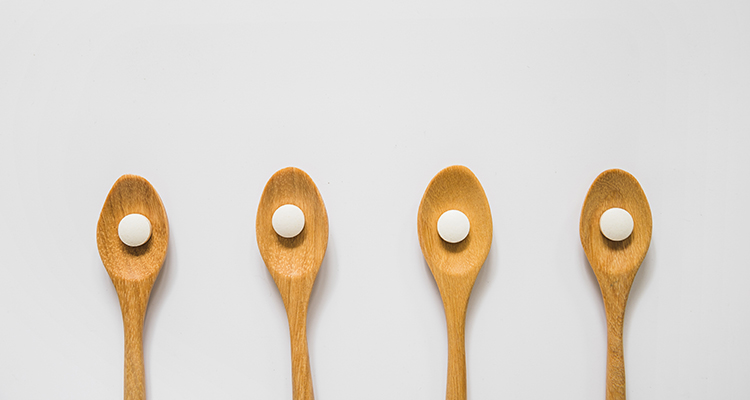The Connection Between Adenosine and Sleep
The human body is an amazing thing. There are hundreds of chemicals, neurotransmitters, and compounds all working together to keep your body and brain functioning in a safe and healthy way. Our bodies also need certain vitamins, nutrients, and elements to create, store, and burn energy. One such chemical compound is adenosine.

As your body exerts energy, your brain slowly and naturally starts producing adenosine, a chemical that influences sleep. Scientists have studied and harnessed this chemical to create a prescription medication used primarily to treat fast or irregular heartbeats. Adenosine receptors are also found in several bodily systems, making them one of the most influential in the human body.
Adenosine serves many purposes but in this particular article, we’ll focus on the role adenosine plays in sleep. By understanding how this chemical works and interacts with your brain and body, you can increase your chances of achieving quality sleep, overcome your sleep troubles, and ease the symptoms associated with certain sleep disorders.
Content
What is Adenosine and How Does it Work?
Let’s take a closer look at this chemical, including exactly what it is and how it works inside the human body. Adenosine is a neurotransmitter that interacts with your body’s natural nervous system, sending signals to certain parts of your body and transmitting important information between cells.

Adenosine receptors allow this chemical to enter certain cells and stimulate changes that then trigger certain biological functions in the human body, including sleep. Adenosine not only controls a person’s need for sleep but also promotes the overall urge to sleep and sleep drive. Adenosine is also known to reduce inflammation by interacting with the body’s immune system. If chronic pain caused by inflammation is one reason for your sleep troubles, prescription adenosine may help. Adenosine receptors have also been located in a person’s urinary, respiratory, and circulatory systems. As a medication, adenosine can reduce pain in some patients, regulate a person’s heartbeat, lower blood pressure, and potentially improve sleep.
Understanding the Connection Between Adenosine and Sleep
Everyone has a natural sleep drive. It’s the internal pressure and urges that we feel to lie down and fall asleep. Your sleep drive plays an important role in maintaining a healthy and balanced circadian rhythm. When your adenosine levels are healthy and your body is functioning properly, you’ll achieve the perfect balance of wakefulness and sleep each day. Maintaining sleep-wake homeostasis helps you feel more energized, productive, focused, and healthy. Although melatonin is often referred to as the sleep hormone and has a direct effect on your circadian rhythm, studies suggest that adenosine also plays a role in how your brain and body respond to light and darkness in relation to sleep.

When you don’t achieve enough sleep or find yourself sleep deprived, your sleep drive kicks in, causing you to feel increasingly tired. You may also notice the desire to sleep for longer periods of time the next day or sleep more deeply, finding it difficult to wake up or shake that morning grogginess.
Adenosine is naturally produced by your brain as your energy stores become depleted. It’s produced alongside another molecule known as adenosine triphosphate, also known as ATP. Scientists refer to ATP as the “energy currency” of your cells because it’s here that your body stores and provides energy when needed. As you use up energy performing daily tasks like working, talking, and exercising, the ATP inside your body slowly breaks down, releasing adenosine. The more energy you exert, the more adenosine your brain produces, and the more tired you’ll become.
Adenosine is released in the basal forebrain, or the front part of your brain, as your body uses energy throughout the day. Once you finally succumb to sleep, these built up stores of adenosine are cleared from the brain and your energy is renewed, starting the process all over again. Scientists also claim adenosine is responsible for facilitating the deepest state of sleep. When adenosine interacts with your central nervous system, it acts like a depressant, inhibiting many of the body’s processes that are associated with being awake.
The levels of adenosine in your body fluctuate throughout the day. For example, levels increase in areas of the brain that are essential for arousal, including the reticular activating system. As levels rise and your brain develops higher concentrations of adenosine, arousal is inhibited and sleepiness becomes more prevalent.
How Does Caffeine Affect Adenosine?
Studies show that caffeinated beverages include coffee, teas, soft drinks, and even energy drinks contain a chemical known as xanthine. Xanthine is a similar chemical to adenosine but has the opposite effects on the human brain and body. Xanthine works to promote arousal and inhibit sleep by blocking how adenosine interacts with the brain. Caffeinated beverages block your brain’s ability to process and produce adenosine, therefore delivering stimulating effects.

But blocking adenosine receptors isn’t the only thing that caffeine does. It’s also known to constrict and dilate blood vessels inside the cardiovascular system. Many people experience an increased heart rate, blood pressure, and breathing rate. You may also notice an increased need to urinate or have a bowel movement. These effects are sometimes reduced in those individuals who consume caffeine regularly, as your body builds a tolerance.
What Are Adenosine Supplements and How Do They Work?
With so much evidence on how adenosine affects sleep and so many people suffering from insomnia and other sleep issues, it was only a matter of time before companies tried to create sleep supplements using these findings. As of this writing, even prescription adenosine isn’t approved or intended to treat sleep disorders due to the potential for adverse effects on the heart and body including rapid heart beat and cardiac arrest.

One study conducted on mice shows that certain supplements and drugs can help promote sleep and inhibit arousal by interacting with adenosine receptors. These medications may also affect the user’s heart rate, blood pressure, and body temperature. Additional research suggests these medications might work to treat insomnia, but none are currently available for public purchase or consumption.
You may have seen dietary supplements that contain adenosine or have adenosine in their names. To clear up any confusion, these medications contain a substance that’s different from pure adenosine, which isn’t currently approved for retail sale. Many of these products are not FDA-approved either, so there’s no guarantee of their effectiveness or potential side effects. Many of these products are also not approved for sleep.
AMPK
AMPK, also known as 5’ adenosine monophosphate-activated protein kinase, is a dietary supplement that’s advertised as a weight loss product. AMPK works to increase metabolic function and help promote weight loss. Some studies suggest that the active ingredients in AMPK can prevent the negative health effects of obesity. It may also work to manage nonalcoholic fatty liver disease in some patients.
ATP
ATP, or adenosine-5’-triphosphate is another dietary supplement designed for people who want an added boost of energy or stamina during exercise and other physical activities. ATP supplements work to combat fatigue, increase alertness, and improve the user’s physical performance and endurance.
Frequently Asked Questions about Adenosine for Sleep
Here are some FAQs about adenosine and sleep that should help clear up any questions you might still have about the chemical and how it works inside your body.

Can you use adenosine to treat insomnia?
No. As previously stated, adenosine in its purest form isn’t currently improved as a safe or effective way to treat insomnia. The main reason being how it may negatively impact the user’s heart rate, putting them at increased risk of cardiac arrest. One study on mice, however, suggested that certain drugs that interact with adenosine receptors don’t appear to affect the heart or body temperature and, therefore, may work as a safe sleep aid with more time and research.
Is adenosine a sleep hormone?
Unlike melatonin, which is a natural sleep hormone, adenosine is a neurotransmitter, which is different. Hormones like melatonin are produced in the body’s endocrine glands, whereas neurotransmitters like adenosine originate in the forebrain.
Can adenosine make you sleepy?
Yes. As the day goes on and you expend more energy, your brain produces and releases increasingly higher levels of adenosine, triggering an overall sense of sleepiness. The more energy you exude, the sleepier you’ll feel. You may also find yourself sleeping longer or more deeply following an especially active day. Following a restful night’s sleep (or a restorative nap), adenosine levels decrease and your energy levels spike, starting the entire process all over again.
How does adenosine impact REM sleep?
REM sleep, also known as rapid eye movement sleep, is the sleep stage where your body becomes semi-paralized but your brain and eyes are extremely active. Here, your brain works to consolidate memories, sort through information, and formulate thoughts and connections. It’s also the stage of sleep where you dream.
Research on the connection between adenosine and REM sleep is somewhat conflicting. Older studies suggest that users taking drugs or supplements designed to interact with adenosine receptors saw an increase in REM sleep. While more recent findings suggest activating these same adenosine receptors decreases time spent REM sleep instead of increasing it. This same study reported that blocking adenosine receptors may decrease overall REM sleep. Most studies are in agreement, however, that adenosine doesn’t increase time spent in deep sleep or slow wave sleep. The rate at which your body metabolisms adenosine, however, may impact a person’s quality of deep sleep and how vulnerable a person is to sleep deprivation.
Tips for Increasing Adenosine
Even though prescription adenosine isn’t approved for use as a sleep aid, there are other ways to naturally increase how much adenosine your body produces including diet, exercise, and certain ADA blockers.

Physical Activity
You already know that the more energy you exert, the more adenosine your brain produces and releases into your body. If you’ve ever felt especially fatigued following a workout or another form of physical activity, you can attribute this sleepiness to your body using ATP for energy. Because of this relationship between physical activity and adenosine levels, some sleep experts suggest hitting the gym or increasing your daily physical activity as a way to also increase adenosine levels and improve sleep.
Studies suggest that an increase in moderate exercise may not be enough to significantly increase adenosine. You may need to incorporate intense exercise into your daily regime to see the benefits.
Diet
When people say, “You are what you eat”, maybe they’re referring to how your diet affects sleep quality. It’s no secret that certain foods like almonds, turkey, kiwis, and chamomile tea promote sleep whereas other foods like chocolate and alcohol act as stimulants, keeping sleep at bay. But the foods you eat can also impact adenosine levels in your body, either improving or hindering your sleep.
Those individuals who follow a Keto style diet that’s high in fats and low in carbs may notice a rise in adenosine levels. That’s because when your body enters ketosis, your energy metabolism changes, increasing the presence of both adenosine and ATP. Other added benefits of following a Keto diet and increasing adenosine levels include brain-protecting and anti-convulsant effects.
ADA Blockers
ADA, or adenosine deaminase, is an enzyme that breaks down adenosine in the body. Therefore, taking supplements and substances that block ADA, may inadvertently increase levels in some people. Natural ADA blockers include curcumin, berberine, stinging nettle, naringenin (a compound found in citrus fruits), and nitric oxide. Cordycepin is an active ingredient found in mushrooms and acts very similarly to adenosine. Cordycepin is also broken down by ADA and, therefore, may offer adenosine-like effects.
Find Natural Ways to Improve Sleep Quality and Take Back Your Health
Sleep plays an integral role in all aspects of your life, offering both physical and mental benefits. Without it, you may notice you’re low on energy, easily confused, and lethargic. Some of these symptoms may be associated with adenosine levels in your body. As of this writing, research on exactly how adenosine impacts sleep is still ongoing, which is one reason adenosine sleep supplements and medications aren’t currently produced for human consumption.

The good news is, there are plenty of other ways to improve your sleep quality by making subtle lifestyle changes that will have a major impact on your overall health, happiness, and well-being. If you’re ready to get started and embrace these positive changes, click here!















